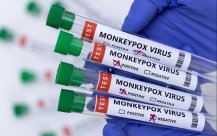(Paris Composite Electric) The World Health Organization warned that as monkey acne virus spread in Europe, cases may surge in the next few months.U.S. officials also said that the United States may find more cases of acne, but this disease is currently very risky to the public.
There have been many cases of monkey acne in Europe and the United States, and WHO held an emergency meeting on Friday.
Crug, director of the European Guard Organization, said: "As we enter the summer of Europe, with a large -scale rally, festivals and gatherings, I worry that the spread may be accelerated."
Monkey acne virus was previously spread mainly in central and western regions in Africa. Symptoms include fever, headache, lymphadenopathy, muscle soreness, etc.The patient's face also appears rash, and then spreads to other parts of the body.
Virus spread may have been continued for a while
However, in recent weeks, cases have been in European countries, and the United States, Canada, and Australia have also confirmed the discovery of monkey acne cases.
Crug described that these cases were "atypical", because except one person, the rest did not travel to countries with popular monkey acne.
He revealed that most of the cases detected in Europe were gay men, and they were treated in sex health clinics after sexual behavior.Because many people do not know the symptoms of monkey acne, "this shows that the transmission of virus may have been last for a while."
Monkey acne virus is not easy to spread between people, but it will spread by contact with body fluid, monkey acne, body fluid or sore -contaminated shells or clothes, or through the droplets that have been exposed to face to face for a long time.
There have been more than a hundred cases outside Africa
At present, there are at least nine countries in Europe that have occurred in the case of monkey acne, including Belgium, France, Germany, Italy, the Netherlands, Portugal, Spain, Sweden and Britain.
The case tracking data of the University of Oxford University shows that since the first case of monkey acne in England on the 7th of this month, more than 100 cases have continued to occur outside Africa.
Massachusetts in the United States has also confirmed the first case of monkey acne this year. Patients have recently been in Canada, but they have no knowledge of Africa.
A US official said: "As the official actively launch monitoring and inspection to find cases, more cases may be found in the next few days ... but it seems that the risk of the public is low." Another anonymous senior official says that monkey acne may be transmitted by intimate contact with patients with rash or sexual intercourse, and sharing sheets, clothing or toothbrushes with patients may increase the risk of infection.
Scientists have shown that monkey acne is not as easy to spread as crown disease, so they expect that the epidemic of the monkey acne will not become a major epidemic disease like crown disease.




